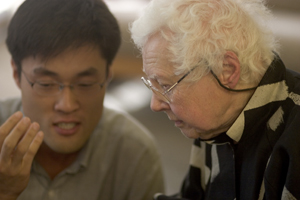Donor Profile: Suzanne Z. Deutsch
Suzanne Z. Deutsch,
A Bequest to the Physics Department
by Elizabeth Chadis, Director of Development // MIT Physics Annual 2006

In her estate plans, Suzanne Deutsch has established a fully endowed fellowship to honor the memory of her late husband, MIT Professor of Physics Martin Deutsch. By doing so, she will ensure that young scientists have the opportunities and experiences so critical to their success. Additionally, she will help the Department of Physics reach its goal of full fellowship support for all incoming graduate students.
“One day, I came home from work and found Martin lying at the top of the staircase in front of the cellar blowing smoke rings,” recounts Suzanne Deutsch, widow of former MIT Professor Martin Deutsch. Her first thought was that he had lost his mind, but as it turned out there was something wrong with the furnace and Martin was “trying to determine the airflow.” Common day-to-day problems such as this were not only to be solved, but in the process of doing so, to be mined for any fresh ideas or insights that may not have been foreseen. While the attendant diversions and delays often entailed in these activities led Suzanne to question whether Martin was procrastinating, they came to be dubbed for what they really were—“experiments” in the household. For Suzanne, they also became an introduction to that which fascinated and gave meaning to Martin’s life: the need to understand the forces of nature and to share the excitement of scientific inquiry with students.
Martin Deutsch was born in Vienna on January 29, 1917 as the only child of parents who were doctors. Helene and Felix Deutsch were psychoanalysts, significant members of Freud’s inner circle. Martin saw himself as “a product of the intellectual culture of Vienna.” In 1935, he came to the U.S. planning to complete a baccalaureate program in two years and enter a doctoral program in one of two fields—chemistry or physics—yet to be determined. He earned his SB in two years, taught and conducted research at MIT for a couple of years before going to Los Alamos to work on the Manhattan Project. After the war, he joined other scientists in speaking out against the proliferation of nuclear weapons. In 1946, Martin returned to MIT where Viki Weisskopf and Bruno Rossi had joined the Physics faculty. His studies in radioactive decay led him to the discovery of positronium in 1951. Martin spent most of his career researching and teaching. From 1973 to 1979, Martin was head of the MIT Laboratory for Nuclear Science.
Martin had a sensitive eye for talented and dedicated students…. Therefore, I want to endow a fellowship as the most fitting way to honor and perpetuate his memory.
Suzanne Deutsche
From the earliest days at MIT, Martin found the scientific environment and collegial spirit of the Physics Department attractive. Thus, increasingly his attachment to physics deepened and became the center of his life’s work. While he made many scientific contributions during his career, many of them significant, he believed his real accomplishment was as an educator. Martin had a sensitive eye for talented and dedicated students, supporting and recruiting then as circumstances dictated. Therefore, Suzanne wants to endow a fellowship as the most fitting way to honor and perpetuate his memory. She feels strongly that Martin would be pleased to know that each year a talented and dedicated person will come to MIT on a fellowship bearing his name.